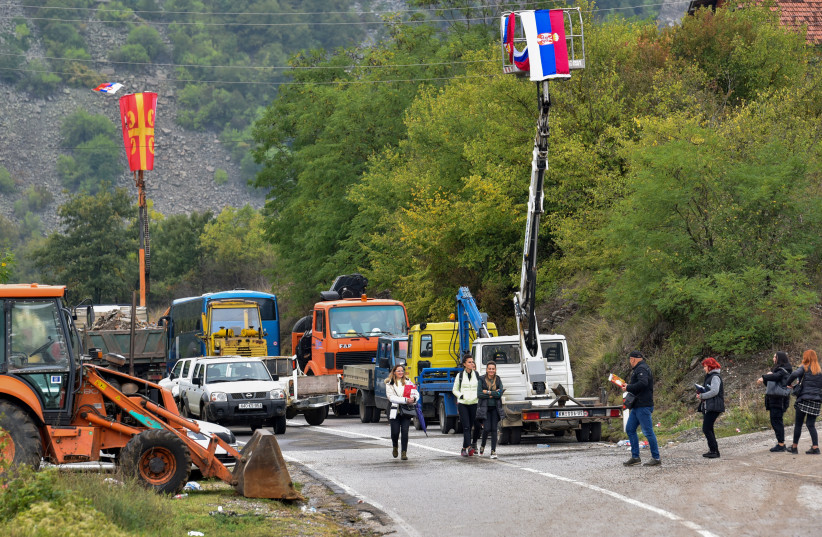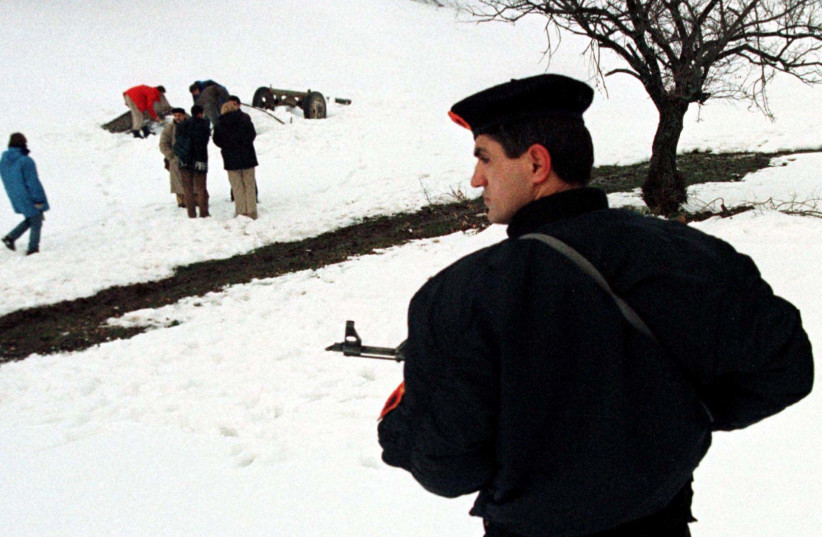Hours after air-raid sirens were heard in the town of Mitrovica in northern Kosovo, Russia’s Foreign Ministry said the Balkan country was working with the US and European Union to threaten its Serbian minority.
This conjures up memories of the Balkan conflicts of the 1990s, particularly the 1999 Kosovo War, when the US mobilized NATO and the international community to drive Serbia out of its southwestern neighbor.
This was a defining moment for a younger Vladimir Putin, as it has been theorized that he has long wanted revenge on the West for what it did in 1999. The war in Kosovo was the height of US power and hegemony in the 1990s, when it was doing humanitarian intervention and acting as a global policeman.
Today, things have changed. Russia is invading Ukraine and threatening to cut energy supplies to Europe. It is working with other authoritarians, such as China, Turkey and Iran, against the US, signing new energy deals and issuing threats. Washington and Beijing, for instance, are at loggerheads over Taiwan and a potential visit by House Speaker Nancy Pelosi.

What is happening in Kosovo?
Serbia was on high alert Sunday night following what happened across its border. For some reason, this was surprising to many.
According to Russia’s media, Foreign Ministry and daily paper Izvestia, the ministry on Sunday called on Pristina, the capital of Kosovo, with backing from the United States and the European Union, to stop provocations and to respect the rights of Serbs in Kosovo.

“The decision of the ‘authorities’ in Pristina to start applying unreasonable discriminatory ‘rules’ on the forced replacement of personal documents and numbers of local Serbs from August 1 is another step towards the expulsion of the Serbian population from Kosovo,” Foreign Ministry Director Maria Zakharova said, according to Izvestia.
“Kosovar leaders know that the Serbs will not remain indifferent when it comes to a direct attack on their freedoms, and they deliberately escalate in order to launch a military scenario,” she said. “Of course, Belgrade is also at the forefront of the attack, which the West wants to additionally ‘neutralize’ with Kosovo Albanian hands.”
"Kosovar leaders know that the Serbs will not remain indifferent when it comes to a direct attack on their freedoms, and they deliberately escalate in order to launch a military scenario."
Maria Zakharova, Russian Foreign Ministry Director
THE AIR-RAID sirens in northern Kosovo took place as gunfire was reported near the border. After the 1999 Kosovo War, many Serbs fled the country, but a sizable minority remained, and they remain to this day.
Kosovo, which declared independence from Serbia in 2008, has been recognized by more than 100 countries, including Israel in 2020, followed by normalization procedures in 2021. At the time, this was viewed as a byproduct of the Abraham Accords, even though the overall context was more complex. Jerusalem has maintained good relations with Serbia, but balancing it with Kosovo has been a diplomatic tightrope walk.
Current Kosovo crisis
The current crisis on the border may stem from attempts by Kosovar authorities not to recognize documents held by Serbs and to stop the use of license plates used by the Serb minority.
Serbian President Aleksandar Vucic has condemned the Kosovo government over this issue in the past. Pristina’s goal is to “expel Serbs, especially from the north of Kosovo and Metohija,” he said, comparing this to the expulsion of Serbs from Croatia in 1995 during Operation Storm, according to the website Balkan Insight, the flagship English site under the umbrella of the Balkan Investigative Reporting Network (BIRN).
Spain’s prime minister was in Serbia on Friday as part of a tour of the Western Balkans. “Prime Minister Pedro Sanchez held talks with Serbia’s President Aleksandar Vucic in Belgrade ahead of his visits to Bosnia-Herzegovina, Montenegro, North Macedonia and Albania in the coming days,” ABC News reported.
Madrid has said in the past it is very close to the Serbian government.
“The Balkan nations are all in different stages of the EU accession process. EU officials have recently sought to encourage governments in the region to move on with reforms amid concerns over Russia’s efforts to boost its influence in the Balkans,” ABC reported. “Serbia remains a rare European country that has kept friendly ties with Russia despite its invasion of Ukraine and refused to join Western sanctions against Russia,” it added.
According to Izvestia, “the Serbian Ministry of Defense denied the participation of the Serbian side in the growth of tension with Kosovo.”
What's really going on?
WITH ALL sides seemingly denying there is any real crisis, major questions remain over why air-raid sirens were sounded and why there are so many rumors.
Why has Russia suddenly made comments about Kosovo, appearing to push a narrative that could drive a new crisis in the Balkans?
Serbia is a close partner of both Russia and Turkey, who are close to each other. Belgrade has recently upgraded some of its air defenses, including procurement of the Pantsir missile systems.
“Serbian President Alexander Vucic praised the quality of Russian weapons and announced the procurement of the Pantsir-S1M air-defense system while examining the Serbian military exposition, dedicated to the Day of Unity, Freedom and National Flag of Serbia,” the Russian News Agency TASS reported last year.
Putin, who came to power in the wake of the 1999 conflict, still remembers the confrontation between Russian and NATO forces over Pristina International Airport on June 12, 1999. The defeat of Serbia by US forces in that year was humiliating for Moscow, which had wanted to save face at Pristina.
The Russian leader vowed to restore Russia, and it has taken him decades to do it. He views the international authoritarian coalition of China-Turkey-Iran-Russia as a key to the multipolar world – one where US hegemony will be weakened.
The recent visit by Russian Foreign Minister Sergei Lavrov to Africa and Putin’s meetings with Iranian and Turkish leaders are all about removing the US from the powerful position it obtained in 1999. Therefore, backing Serbia is about showing how things have changed over the past 20 years.
It remains unclear whether Serbia wants to risk going all-out against Kosovo again. Vucic’s decision on Monday night and those he will make in the coming days will be a major test of how Russia’s drive for a new world order is reshaping the globe.
